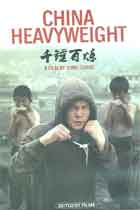
China Heavyweight 2012
Distributed by Zeitgeist Films, 247 Centre Street, New York, NY 10013; 212-274-1989
Produced by Eyesteel Film, Yuan Fang Media
Directed by Yung Chang
DVD, color, 89 min.
Sr. High - General Adult
Asian Studies, Sports, Boxing
Date Entered: 01/11/2013
Reviewed by Cliff Glaviano, formerly with Bowling Green State University Libraries, Bowling Green, OHThis video provides fascinating insights into today’s rural China and Chinese methods for developing world-class athletes. Mao Zedong banned boxing in China in 1959 as too violent and too Western. The ban was lifted in 1989. The film opens with the recruiting of young men and women to Coach Qi Moxiang’s boxing program in a Sichuan Province elementary school. Former professional boxer Qi and assistants promote boxing as being a way out of a backward village—amateur boxing first, then a wider path to a future as a professional boxer. The path to success is from primary school boxing, to high school boxing, to the Sichuan Provincial Team for the most talented, who potentially escape futures as tobacco farmers or peasant wives. The film follows young male boxers Miao Yunfei and He Zongli as they work toward their dream. Meanwhile, Coach Qi comes out of retirement to pursue a final shot at the WBC Asian boxing title.
Economically and socially, there seems little that is not impacted by the lure of success in sports in China. In this case, boxing can be an escape from rural poverty though it clearly separates the young from their families. The economic impacts range from the local boxing festival arranged to put the village on the map; to provincial teams, facilities and championships; to national teams and training facilities feeding China’s Olympic boxing teams; to national professional training facilities, certifications and bouts that provide entertainment throughout China. The filmmaker gives viewers an intimate, emotional look at boxing in China through the eyes of fathers, mothers, sons, coaches, competitors and local politicians. These viewpoints reflect continuing conflicts in Chinese society: rich or poor; rural or urban; agriculture or manufacturing; traditional families or entrepreneurs; amateurs or professionals.
This video is highly recommended. As Miao, He, and Qi pursue their dreams they are influenced by much more than their successes and failures. Each feels an obligation to his family as well as an obligation to make the best possible future for himself. Each is molded by his family, his competitors, his mentors, and Chinese society at large. Each must make lifelong choices based on personal perceptions and talents. Cinematographer Sun Shaoguang does an exceptional job of beautifully capturing China’s contrasts and the emotional moods of the subjects.